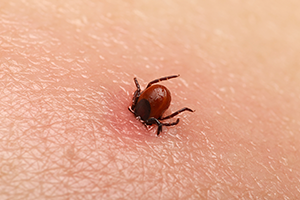
Yes, tick bites can be quite dangerous. Unfortunately, ticks are common here on Long Island and in our nearby outdoor recreation areas. If you enjoy spending time outdoors in the spring and summer, you’ve likely had a run-in with ticks at some point, and getting bit by one is not something to take lightly.
The thing that makes tick bites dangerous is the possibility – even though it’s small – of it leading to tick-borne illness.
Tick-Borne Disease Risks on Long Island
The risk of contracting tick-borne disease from a single bite is low, but it’s nevertheless important to understand the risks. These are the most common tick species on Long Island and the diseases they’re known to carry.
American Dog Tick (Dermacentor variabilis)
- Rocky Mountain Spotted Fever (RMSF): One of the most severe tick-borne illnesses in the United States, symptoms typically include fever, headache, rash, muscle aches, and fatigue. Without prompt treatment, RMSF can lead to serious complications or even death.
- Tularemia: Also known as rabbit fever, symptoms may include fever, skin ulcers, swollen lymph nodes, headache, and fatigue. In severe cases, tularemia can affect the lungs or other organs.
Deer Tick (Ixodes scapularis)
- Lyme Disease: The most common tick-borne illness in the United States, early symptoms may include fever, headache, fatigue, and the characteristic bullseye rash. If left untreated, Lyme disease can lead to more severe symptoms affecting the joints, heart, and nervous system.
- Anaplasmosis: Symptoms include fever, headache, muscle aches, chills, and fatigue. In severe cases, anaplasmosis can lead to complications such as respiratory failure or organ damage.
- Babesiosis: Caused by microscopic parasites, babesiosis symptoms may include fever, chills, sweats, fatigue, and muscle aches. Individuals with weakened immune systems or other underlying health conditions are especially at risk.
Lone Star Tick (Amblyomma americanum):
- Ehrlichiosis: Symptoms can vary but often include fever, headache, fatigue, muscle aches, and in some cases, rash. Severe cases of ehrlichiosis can lead to complications such as respiratory failure or organ damage.
- Southern Tick-Associated Rash Illness (STARI): Also known as Masters’ disease, STARI presents with a rash similar to that of Lyme disease (erythema migrans) but is generally considered less severe and without the systemic symptoms commonly seen in Lyme disease.
- Alpha-Gal Syndrome: An allergic reaction to red meat (such as beef, pork, or lamb) triggered by the alpha-gal carbohydrate, this condition can cause delayed allergic reactions several hours after consuming red meat.
Need an Estimate for Tick Control?
What Should You Do If You Have a Tick Bite?
It’s best to remove the tick as soon as you notice it. There’s some evidence that in the case of some tick-borne diseases like Lyme disease, your risk of contraction increases the longer the tick remains on your body.
- Carefully remove the tick – Use tweezers to grab the tick as close to the skin as possible. Pull directly up. Don’t twist or jerk the tick. Sometimes the tick splits, leaving the mouth parts behind. If so, try to remove the mouth parts with tweezers as well.
- Save the tick in a container of alcohol – That way if the doctor needs to see it for diagnosis, you have it.
- Do not use a match or petroleum jelly – While these home remedies can kill the tick, they can also cause the tick to regurgitate into the wound, causing an infection.
- Clean the wound – Wash it with warm water and soap. Dab alcohol or disinfectant on the wound to avoid infection. Cover the wound.
- Monitor the wound, and pay attention to how you feel – If you start to feel unwell, contact a medical professional. They can determine if the tick-transmitted any diseases or if there are any signs of infection. Early treatment of tick-borne diseases leads to more positive outcomes.
Can You Be Allergic to Tick Bites?
Yes, tick bite allergies are not uncommon. If you are allergic to your tick bite, continue to monitor it. It may go away on its own. If the reaction becomes too uncomfortable or you start experiencing additional symptoms, contact a medical professional.
Here are the most common symptoms of tick bite allergy:
- Rash
- Pain or a burning sensation at the bite location
- Blisters
- Swelling
- Difficulty breathing
Tick Bite Day One
During your first day after getting bit by a tick, there are a range of ways you may feel. For most people, and hopefully for you, the symptoms are mild. The bite may be irritating and you may want to scratch it – try to resist. This will increase inflammation.
Tick-borne illness symptoms are unlikely to present themselves on the first day. However, people do sometimes feel slightly sick or “off” shortly after getting bit by a tick.
What Should You Do If You Get a Tick Bite While Pregnant?
If you get bitten by a tick while pregnant, we recommend contacting your doctor immediately and following their recommendation. They may want to monitor you closely or run tests. Lyme disease is associated with pregnancy complications, but if diagnosed and treated early, prognoses are often positive.
Are Tick Bites Dangerous to Pets?
Yes, tick bites are dangerous to your furry friends as well. Dogs are susceptible to Lyme disease and many other tick-borne diseases. Cats rarely get Lyme disease, but they can also be affected by tick bites and tick-borne illnesses in many ways.
Long Island’s Tick Control and Prevention Experts
It’s important to be aware of the dangers of tick bites. There are some ways you can prevent tick bites when you spend time outside, but most people only follow those recommendations when they’re spending time out in nature. Here in Long Island, it can happen in your backyard too.
Make sure it doesn’t happen in your backyard – reach out to the tick control experts at Arrow today. We’ll send an experienced expert to apply our highly effective lawn treatment for ticks to the affected areas.
Ready to protect yourself, your family, and your furry family from the dangers of tick-transmitted diseases? Call us today for a free estimate.
Back to Flea and Tick Exterminators – Control – Removal